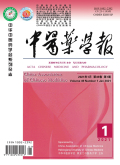中医药学报2024,Vol.52Issue(4):1-6,6.DOI:10.19664/j.cnki.1002-2392.240065
基于"伏邪理论"探讨CAC发病中TAMs/MUC1介导的结肠炎性微环境形成机制
Formation Mechanism of Colonic Inflammatory Microenvironment Mediated by TAMs/MUC1 in CAC Based on the'Theory of Latent Pathogen'
摘要
Abstract
Inflammatory microenvironment plays a crucial role in the process of"inflammation-cancer"transformation of colon.The transformation process mediated by the inflammatory microenvironment is similar to the theory of'Latent pathogen'in traditional Chinese medicine(TCM).Based on the theory of'Latent pathogen',this paper explores the mechanism of colonic inflammatory microenvironment formation mediated by the relationship between TAMs and MUC1,and we believe that abnormal expression of MUC1 could be used as an indicator for the study of"latent phlegm".It is also suggested that in the clinical prevention and treatment of colitis-associated colorectal cancer(CAC),the basic principle should be outthrusting the pathogen.Furthermore,flexibly applying such treatment methods as fortifying spleen and resolving phlegm,regulating qi,clearing warm pathogen,and promoting blood circulation and detoxification is also helpful.关键词
伏邪理论/炎性微环境/痰/CAC/TAMs/MUC1Key words
Theory of Latent pathogen/Inflammatory microenvironment/Phlegm/CAC/TAMs/MUC1分类
医药卫生引用本文复制引用
何雪,马淑然,孙一珂,胡孙林,刘旭,刘雷蕾..基于"伏邪理论"探讨CAC发病中TAMs/MUC1介导的结肠炎性微环境形成机制[J].中医药学报,2024,52(4):1-6,6.基金项目
国家自然科学基金青年项目(82104706) (82104706)
北京中医药大学新教师项目(2022-JYB-XJSJJ004) (2022-JYB-XJSJJ004)

